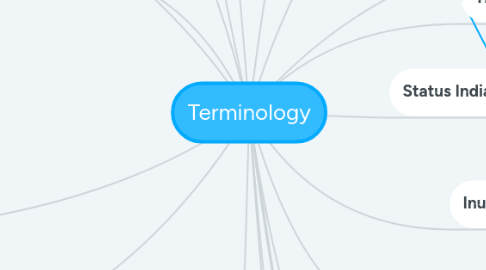
1. In regards to Land
2. Treaty
2.1. A formally concluded and ratified agreement between two countries on topics and issues such as trade, peace, immigration etc.
3. Settler Canadian
3.1. The term used for all the inhabitants of the land we call Canada who are not Indigenous
4. First Contact
4.1. The term used for the first contact between settlers in the 1600’s and Indigenous peoples in North America
5. Reconciliation
5.1. The restoration of friendly relations between people or groups after an argument or a disagreement and finding a way to make two different ideas or facts exist or be true at the same time
5.1.1. For example, a step towards reconciliation between Indigenous people and non-Indigenous people is the Indian Residential Schools Settlement Agreement which aims to bring closure to the legacy of Indian Residential schools such as through counselling and the establishment of the Truth and Reconciliation Comission.
5.1.2. For example, Prime Minister Stephen Harper on behalf of the Government of Canada as well as all Canadians, offered an apology to former students of Residential schools, recognized the inter-generational damage caused by this policy to former students of Residential Schools, their families and communities and asked for forgiveness for failing the Aboriginal peoples of Canada .
6. Land Claims
7. Comprehensive Claims
7.1. It is based on the acknowledgement that there are continuing Aboriginal rights to lands and natural resources. It includes land title, fishing and trapping rights and financial compensation.
8. Specific Claims
8.1. This type of claim deals with certain grievances that First Nations may have regarding the fulfillment of treaties and covers grievances relating to the administration of First Nations lands and assets under the Indian Act.
9. Haudenosaunee
9.1. Known as the "Six Nations," comprising of the Mohawk, Onondaga, Oneida, Cayuga, Seneca, and Tuscarora peoples
10. Status Indian
10.1. A person who is legally registered as an Indian under the Indian Act
11. Non-Status Indian
11.1. A person who is not registered as an Indian under the Indian act
12. Inuit
12.1. Aboriginal people in Northern Canada, who live in Nunavut, Northwest Territories, Northern Quebec and Northern Labrador
13. Metis
13.1. People of mixed First Nation and European ancestry who identify themselves as Metis, as distinct from First Nations people, Inuit, or non-Aboriginal people.
13.1.1. Many have ancestral connections to the Red River Settlement in Manitoba
13.1.2. Are descendants of parent who was a French or English settler and an Indigenous person
14. First Nations
14.1. It is a term that came into common usage in the 1970s to replace the word “Indian,” and is an umbrella term for people who are original to the country we call Canada. It includes both status and non-status peoples in Canada
14.1.1. This implies that there a great amount of Indigenous groups in the country known as Canada, that First Nations were here before first contact and that they were Nations that deserve recognition and sovereignty
15. Unceded
15.1. Term that means not ceded or handed over; unyielded
15.2. For example, Wikwemikong is an unceded First Nation reserve in Canada as the Wikwemikong First Nation have not given up title to its land to the government by treaty or other means.
16. Indigenous
16.1. A global term for people who are original to a geographic location
17. Aboriginal
17.1. Canadian term for people who are original to the land we call Canada
17.1.1. It is used to include three groups previously defined by earlier categories: “Indian,” “Inuit,” and “Métis.”
18. Native
18.1. An older term for people who are original to a geographic location, particularly the land we call Canada
19. Anishinaabe
19.1. Autonym for a group of culturally related Indigenous peoples in Canada and the United States that include the Odawa, Ojibwe, Potawatomi, Oji-Cree, Mississaugas, Chippewa, and Algonquin peoples.
20. Reservation
20.1. A tract of public land set apart for a special purpose
20.1.1. As for example, it is an area of land separated by the government for occupation by Indigenous peoples to live on

